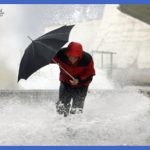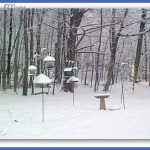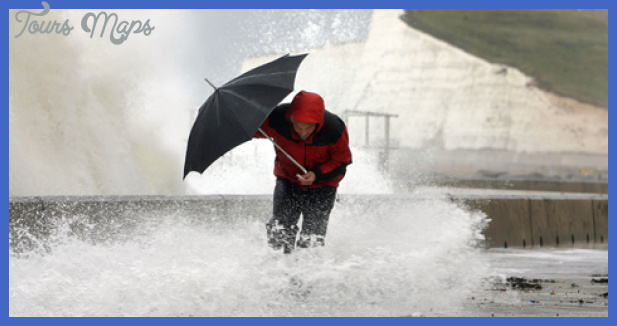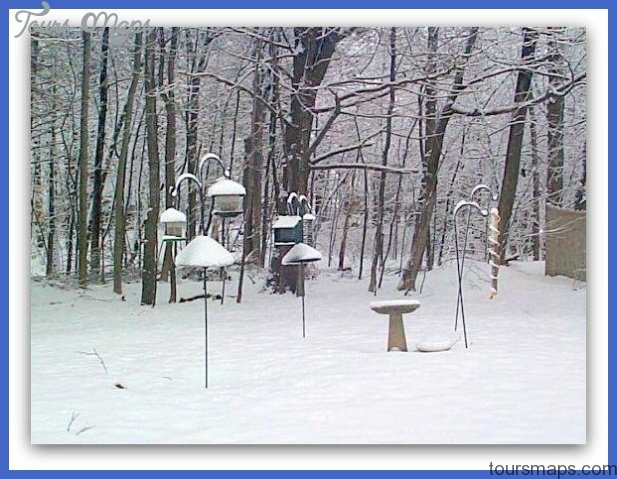Weather can make or break your fishing trip. Wind, rain, prolonged spells of hot or cold temperatures, the whims of the Gulf Stream, and approaching fronts all create unique conditions that must be dealt with if you are to be successful.
Maine is not so much a producer of storm fronts and varying weather patterns as it is a receiver. Typically, systems approach Maine from the south and west in summer and from the north and east in winter. Constantly changing barometric pressures from arriving or departing fronts can turn fish on or off at a moment’s notice.
When fishing during an approaching low-pressure system, you should persevere even if the fish are not biting because a major feeding spree may occur. On one occasion, we were trolling for brown trout in a Midcoast lake, and the total take was two trout in seven hours of fishing. Low clouds scudded over the distant hills and cold drizzle fell from a leaden sky. The nasty weather had arrived that morning and although fishing had been good until then, the changing air pressure had made the fish reluctant to bite. Assuming that it was only a matter of time until the trout would put on the feedbag, we trolled over areas that had produced earlier in the week. Suddenly, large trout began to hit our streamer flies with reckless abandon. No sooner did we unhook one fish and get the fly back in the water than another would strike. Some of the fish hit within a few feet of the boat, as the line was being payed out. The action lasted only 20 minutes, but those were the 20 minutes we had been dreaming of all winter.
High pressure generally has a negative effect on Maine freshwater fish, though it has little bearing on saltwater species. It takes several days for fish to adjust to newly arrived high pressure. Such changes in fish behavior are more notable in ponds and lakes than streams and rivers. If you have a flexible schedule, it is better to fish before, during, or immediately after a low-pressure system passes through than during an approaching or newly arrived high-pressure system. Inevitably, gusty winds accompany high air pressure, adding another factor to the equation. On the other hand, the best time to go fishing is every chance you get, but don’t expect too much during an approaching high.
Wind is probably the biggest bugaboo for Maine anglers fishing ponds, lakes, and rivers. Depending on what you are fishing for, wind can be your friend or your enemy. Trolling for landlocked salmon or brown trout is best if accompanied by at least a light breeze to stir the water. On the other hand, casting for bass or trout is made difficult when gusts of wind impede boat handling. Sometimes the only way you can conveniently fish during windy weather is to anchor at every spot.
Wind can be a blessing or a curse for fly fishers. High wind can blow mayflies away from the stream as soon as they hatch, leaving trout nothing to come to the surface for. In summer, wind can actually be beneficial because terrestrial insects are swept into streams from the riparian habitat, stirring otherwise lethargic trout to activity.
A great many of Maine’s lakes and ponds are situated in a north-south direction, courtesy of the last glacier to pass through the region. If you want to go fishing during periods of moderately high wind, take into consideration which direction the wind is coming from. If, for instance, you want to fish a north-south oriented lake and the wind is from the north, you will have little chance of finding a lee where the wind is not an issue. In this case, you would be better off to consider a lake that heads east and west. The north shore would likely offer some relatively calm areas.
Tips and Advice Dealing with Maine Weather Photo Gallery
Maybe You Like Them Too
- The Best Cities To Visit in The World
- World’s 10 Best Places To Visit
- Coolest Countries in the World to Visit
- Travel to Santorini, Greece
- Map of Barbados – Holiday in Barbados




